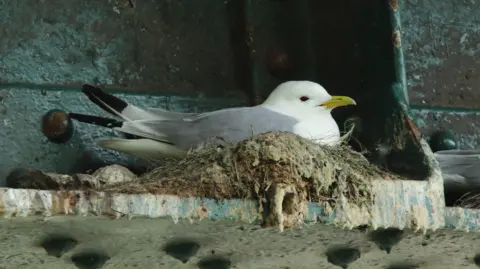Kittiwakes videos sought to help research
 Daniel M Turner
Daniel M TurnerResearchers want the public to share pictures, videos and audio clips of kittiwakes, a type of seabird, as they seek to help them better co-exist with humans
Kittiwakes have been a common feature on the Newcastle-Gateshead Tyne Bridge and the Baltic Centre for Contemporary Art since the 1960s.
A team at Northumbria University is investigating how the birds are currently sharing the quayside area with people.
Project lead Dr Jiayi Jin said they were watching how the current Tyne Bridge restoration works, which are expected to be completed in 2028, could also impact the birds who migrate to the area from March to early September.
Project co-investigator Dr Ayse Ozbil Torun said kittiwakes are "very loyal birds".
"They are part of our daily lives living in Newcastle."
The team started its year-long research project this month, and will combine architecture, urban studies, computer science, and ornithology to propose strategies to ensure the birds can coexist successfully with humans in the future.
 Northumbria University
Northumbria UniversityThe birds' presence has not always been welcomed in the area.
Noise and mess caused by hundreds of breeding pairs has seen many riverside businesses installing deterrents such as spikes and nets.
The team are asking people to submit footage of kittiwakes on the River Tyne from the last 10 years.
Dr Bing Zhai, also a co-investigator, said they will also use AI.
"We're trying to understand what the birds are doing in that area," he said.
"Are they resting? Or are they looking for food? Or are they just looking for their nest?"
Dr Jin added that the research was met with an "enthusiastic" response from organisations like the Baltic Centre and kittiwake research expert Daniel Turner, from the Natural History Society of Northumbria.
